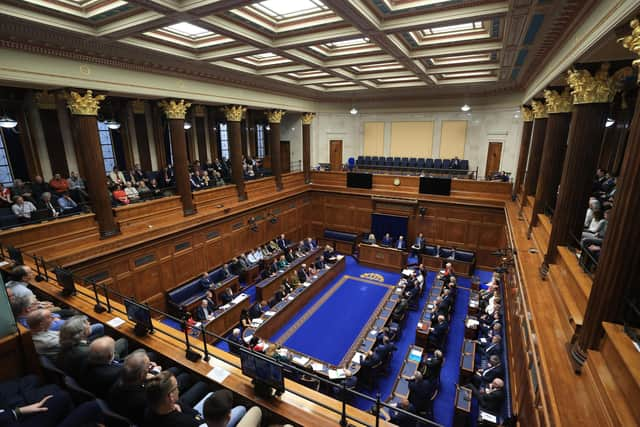Details of a £3.3 billion funding package confirmed but Stormont must raise £113m of revenue in its next budget, says Government
and live on Freeview channel 276
The stipulation was outlined as the Government confirmed details of the support settlement in a letter to Stormont Finance Minister Caoimhe Archibald.
The Government described it as a “significant, fair and generous” package.
Advertisement
Hide AdAdvertisement
Hide AdThe letter was sent amid a simmering political row on whether the settlement is dependent on the devolved Executive introducing its own new revenue-raising measures.


First Minister Michelle O’Neill and deputy First Minister Emma Little-Pengelly have both raised concerns on the impact of new or hiked charges on hard-pressed families in the region.
On Monday, Ms O’Neill definitively ruled out the introduction of water charges as a tool to raise extra cash.
The Government said the financial settlement included a requirement for the Executive to deliver a balanced budget for 2024/25 that includes a minimum of £113 million raised through locally generated income.
Advertisement
Hide AdAdvertisement
Hide AdMinisters in Belfast will also be expected to publish a “comprehensive and costed” long-term strategic infrastructure plan that sets out priority areas for action and how they will support prosperity and growth.
The broad shape of the financial package was already known after it was hammered out in negotiations between the local parties and the Government at Hillsborough Castle before Christmas.
Details on the financial package outlined in the letter to Ms Archibald include:
– Reform of the Barnett formula for allocating Treasury funds to Northern Ireland, with funding rates for the region set at 24% above comparative rates in England. The Government said this would reflect the “different levels of need in Northern Ireland”.
Advertisement
Hide AdAdvertisement
Hide Ad– A £1 billion fund to stabilise Stormont’s public finances.
– £34 million to tackle spiralling hospital waiting lists.
– Flexibility to allow deferment of repayment of a multimillion-pound overspend of Treasury funding during the powersharing impasse.
– Funds to help meet public sector pay demands in the current financial year.
– Boost the Executive’s spending powers to transform public services by repurposing in excess of £700 million of existing and new UK Government funds.
Advertisement
Hide AdAdvertisement
Hide Ad– Increase the Executive’s annual capital borrowing limit by 10% in 2024/25, a limit which will then increase annually in line with inflation.
The Government said it has also committed to open discussions with the Executive on a “new fiscal framework” for Northern Ireland.
Northern Ireland Secretary Chris Heaton-Harris welcomed confirmation of the settlement’s details.
“This package tackles the immediate budget pressures facing the restored Executive and allows it to take action to rapidly stabilise public services, while increasing opportunities for investment and improved infrastructure,” he said.
Advertisement
Hide AdAdvertisement
Hide Ad“It also paves the way for vital transformation of public services, and will deliver well-deserved pay awards for public sector workers.
“It is now for the Northern Ireland Executive to use this significant financial package to take forward the vital work of public service transformation and the commitment to deliver sustainable finances – ensuring better outcomes in the day-to-day lives of the people in Northern Ireland.”
Asked about localised revenue raising measures on Monday, Ms O’Neill insisted the onus should instead be on the Government to deliver a “proper funding model” for Northern Ireland.
She made clear the Executive would not be introducing water charges.
Advertisement
Hide AdAdvertisement
Hide AdWater charging is not the only option open to ministers to raise extra cash for public services, but it is one of the more significant potential tools at their disposal.
Other options could see ministers hike rate bills paid by households in Northern Ireland, or cut universal concessions such as free prescriptions or public transport passes for people aged 60 and above.
MS O’Neill’s comments chimed with weekend remarks by DUP deputy First Minister Ms Little-Pengelly, who said it was unsustainable to ask people to pay more for “poor public services”.
Comment Guidelines
National World encourages reader discussion on our stories. User feedback, insights and back-and-forth exchanges add a rich layer of context to reporting. Please review our Community Guidelines before commenting.